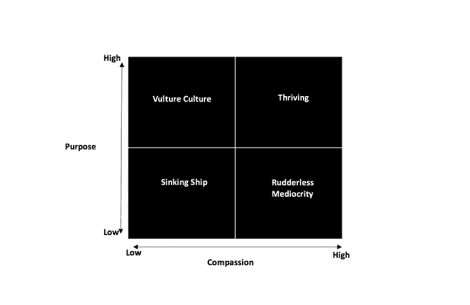- Home
- Our Purpose At Ie University
- Knowledge At Ie University
- The Soft Power Of Compassionate Management
The Soft Power of Compassionate Management

Times of pressure make clear the importance of practicing compassionate management, writes Professor Kriti Jain. She offers three lessons based on pandemic related experiences for how leaders can thrive by combing purpose with empathy.
By Kriti Jain, IE Business School Professor of Human Resources and Organizational Behavior.
The dry business logic of balance sheets, profits, and shareholder value does not typically include concepts such as kindness, caring, and compassion. In fact, the general consensus is that companies must be ruthless when it comes to cost-cutting and layoffs, HR departments should be rule-bound, and managers authoritative and commanding.
If you’ve been a leader – be it of a small group or a big organization – you know well the feelings of insecurity that can underlie the armor of “bossiness.” Internally, you have likely thought, at one time or another: Are people going to listen to what I say? Are they thinking well of me? What if my friendliness is misinterpreted as a sign of weakness and leniency? Thought-patterns like this can be further exacerbated in some cultures, especially in Asia and Africa, where the leadership ladder is enmeshed with seniority and hierarchy.
Even the kindest of people can find themselves operating in ‘survival mode’ under the pressure of competition. Excessive rivalry competition between peers can lead to unethical conduct as well as sabotaging others. A conceived threat to one’s job, increased workload, and tight deadlines can induce short-termism, which in turn kicks off our primal instincts of self-preservation at all costs.
It is in times of pressure – such as now – when compassionate leadership becomes even more important. Jeff Weiner, Executive Chairman of LinkedIn, is one of the foremost proponents of this when he says that businesses need empathy + action. Employees and customers are carefully watching every move that leaders make, and respond accordingly. Take for instance, a student of mine named Robert, who told me recently:
“I have always enjoyed the fast growth of the firm where I work. But during this period of COVID, I saw that the main priority of the firm remains shareholder value maximization. I feel my company doesn’t deserve my loyalty and dedication. I am going to change my job soon.”
Leading with compassion can seem like a paradox to executives. Many leaders I work with assume that compassionate management means they must also accept a certain level of mediocrity. For example, imagine if an employee is dealing with some problems at home and thus isn’t able to perform at his or her best in office. Until when should you, as a manager, be considerate and accept the lowered performance?
However, this doesn’t need to be an either-or question. Leaders can cultivate an organizational culture that celebrates both excellence and compassion together. The key ingredient is Purpose.
Organizations that lack a clear and articulated purpose and are also devoid of compassion often have a culture of apathy: no one cares about anything or anybody. It’s a sinking ship. A clear purpose brings focus and direction, but without the ‘we’ mindset and solidarity, this can quickly become a cut-throat, vulture culture. Employees notice quickly, as my student Robert did, when they find themselves in a company culture with this mismatch between what is said and what is practiced. Likewise, a lack of purpose compounded by too much compassion leads to rudderless mediocrity: everyone is stagnant and complacent.
In order to thrive, leaders must combine purpose and compassion. I offer three lessons from recent pandemic-related experiences:
- Give people freedom. One significant change from the pandemic, which seems here to stay, is an increase in working from home. But, along with it often comes micromanaging as the old systems that allowed leaders to develop trust in their employees are no longer relevant. Companies are now measuring productivity through analytics based on number of emails sent, meetings attended, and calendar events. This intensely data-driven view does not do justice to the employees. Managers must trust workers enough to give them the freedom to decide ‘where’, ‘when’, and ‘how’ they do their activities. The leader’s role is to provide the ‘why’.
- Create feedback and work rituals. Managers sometimes equate giving workers freedom and autonomy with absolving themselves of managerial responsibility. As one employee told me, “I love my independence but it has had an unintended adverse effect on the level of feedback and support provided by my manager.” And particularly in the current pandemic environment, work-from-home policies can exacerbate this issue. Managers should schedule regular check-ins with employees or organize virtual coffee breaks or TGIFs. Rituals like these are a low-cost solution that effectively maintain the rhythm and connectedness of a team. But it’s also important to make sure that these do not become just another item on the checklist.
- Identify social impact. An employee working for more than a decade in an airline cargo division told me that he felt that he didn’t do work that had impact on society and the world at large. This feeling became more intense during the pandemic. He said, “one of the inerasable thoughts was: am I going to die without doing any good to the world?”However, he sensed a difference in himself and his fellow workers when the company transported animals, medicines, or relief materials. He focused on working with the company to identify ways to tell the story of these products - by whom and for whom - and began to see his role in “delivering hope,” not just boxes.
Building purpose-driven organizations doesn’t have to entail fancy language about social impact, climate change, and sustainability on the company website. Leaders can build small everyday practices into employee activities in order to cultivate a sense of meaning and purpose. Leading with compassion is not only about improving the health and well-being and pay of employees in exchange for increased loyalty and dedication. It is about re-building the confidence in each other. Our society has long been broken. It is time to be more human and more humane.
